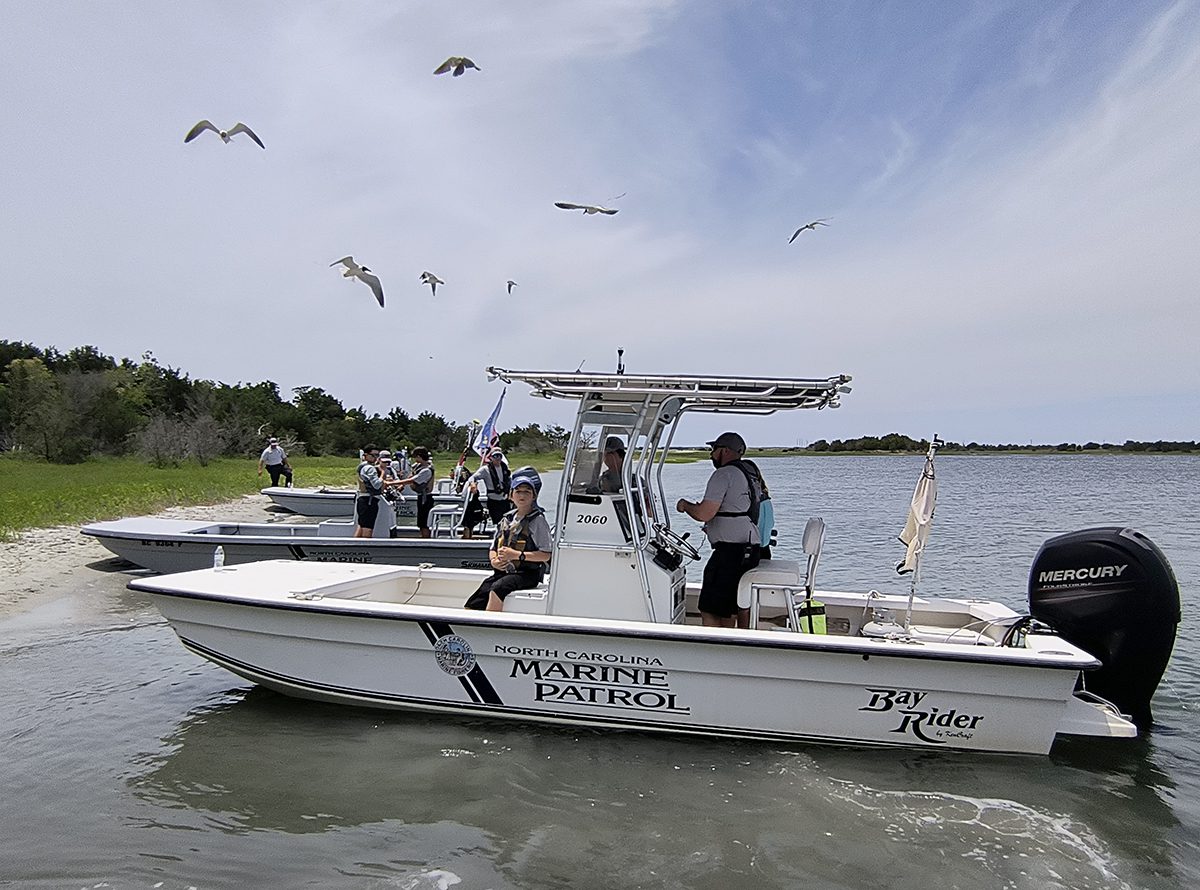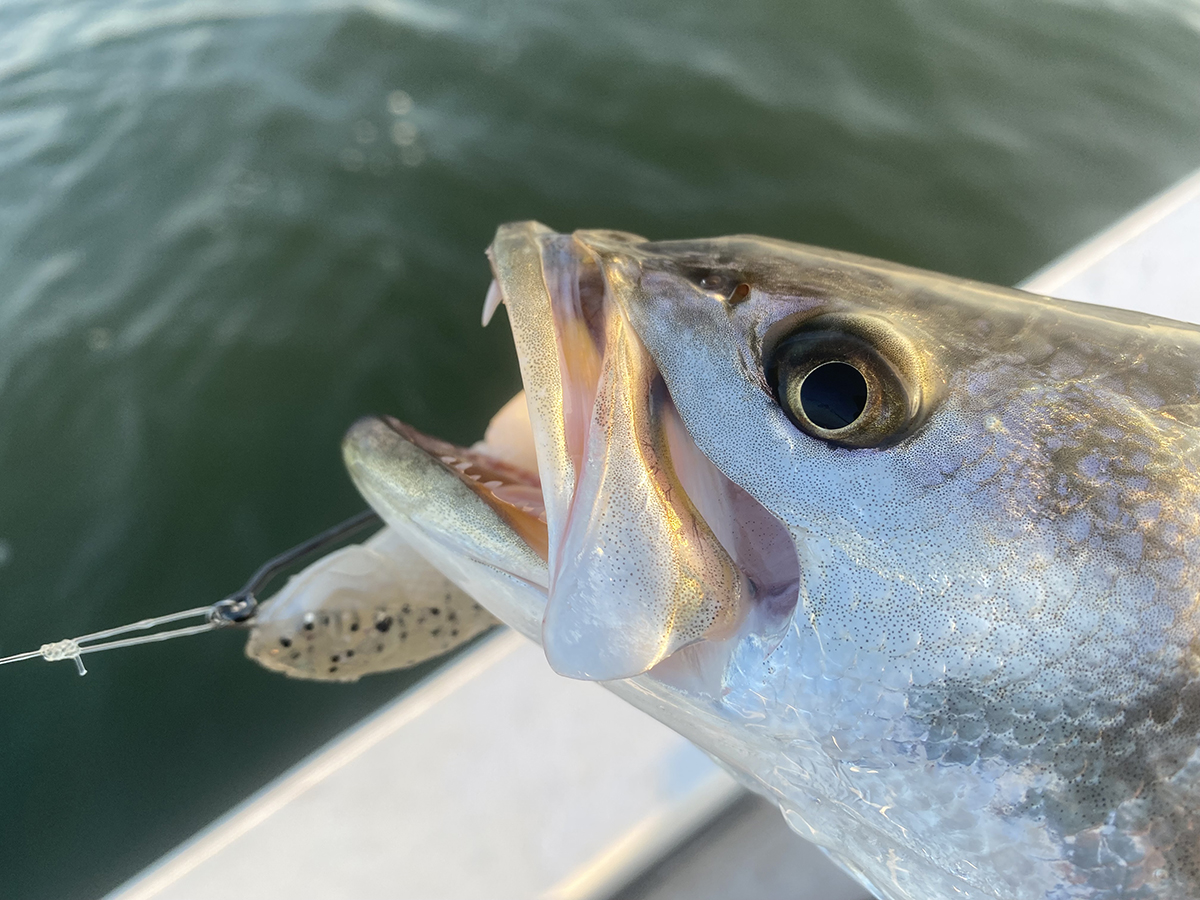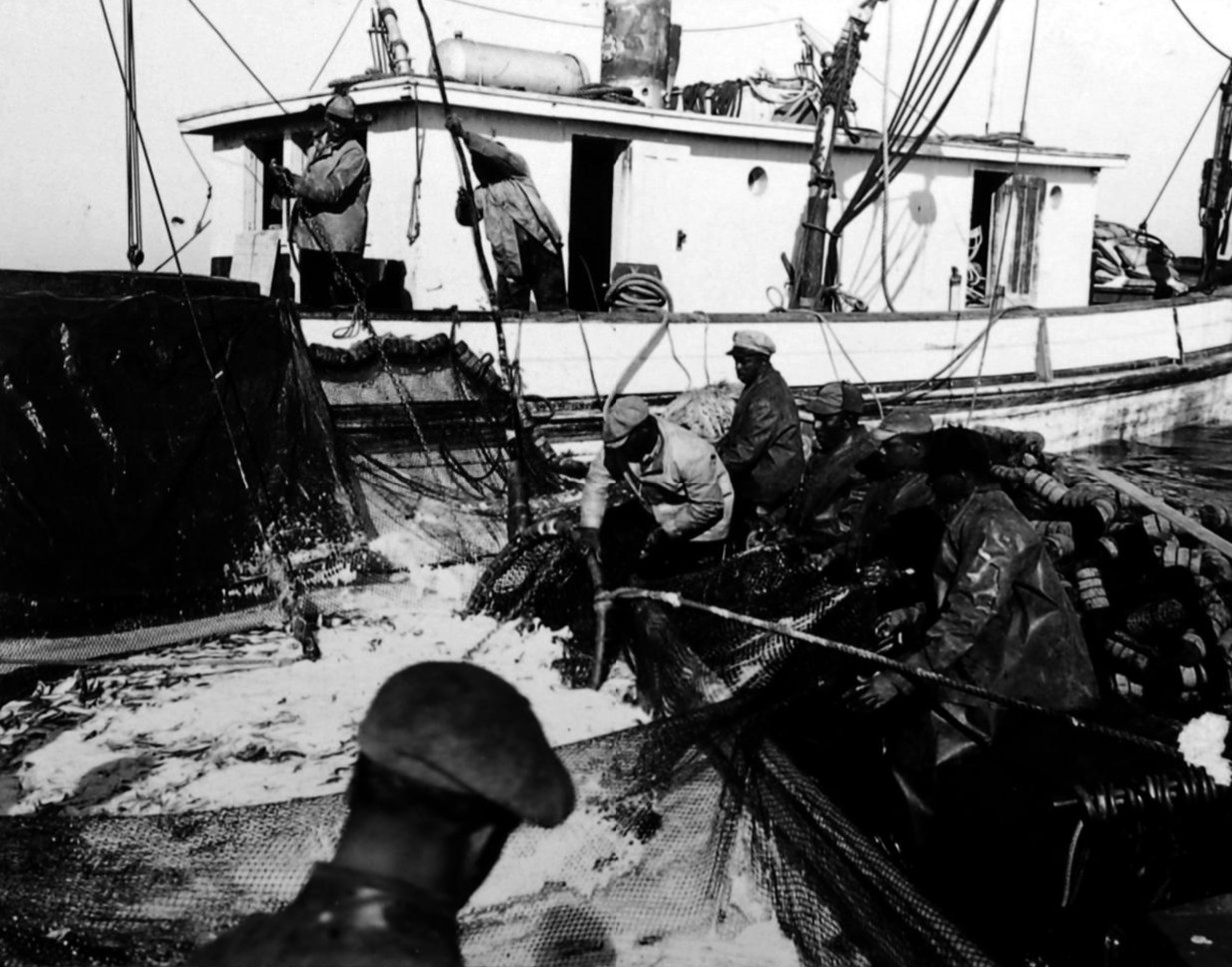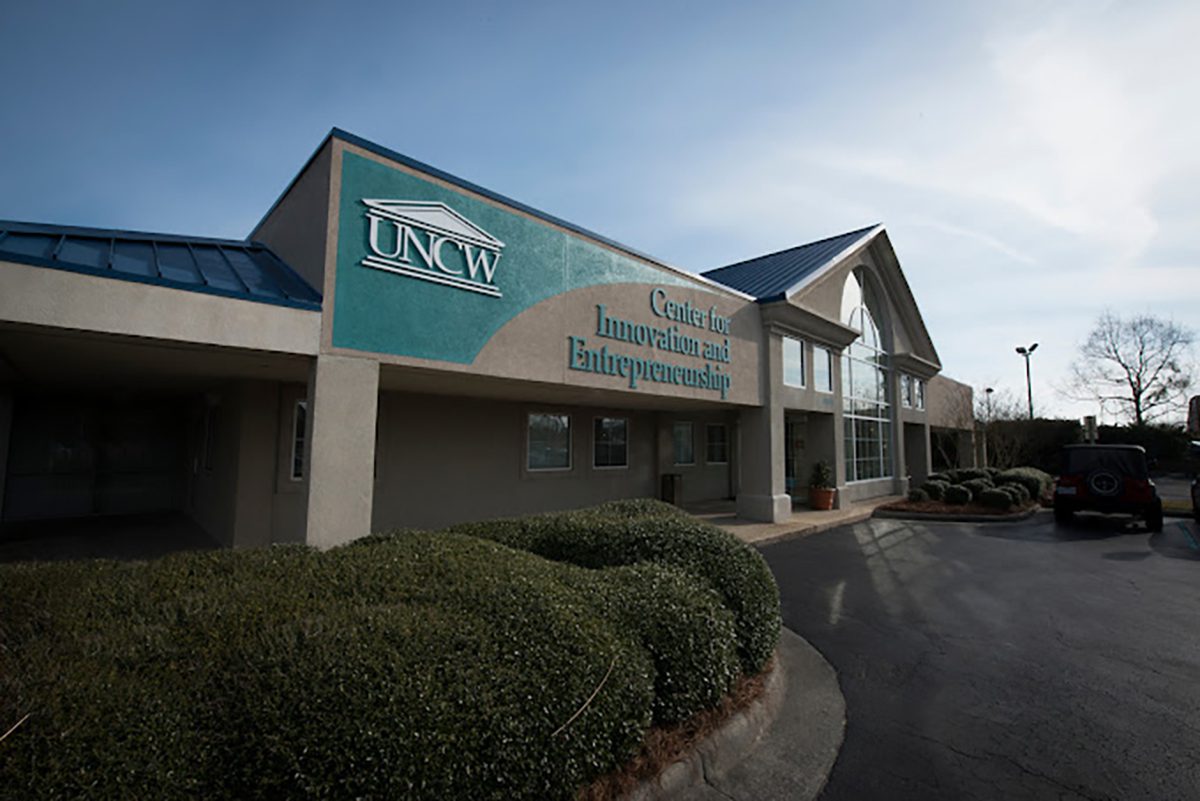
If you saw middle schoolers at the helm of Marine Patrol skiffs gliding across Carteret County waters earlier this month, you caught a glimpse of the first group to participate in the first-ever North Carolina Marine Patrol Junior Academy.
Organized by the Marine Patrol, the camp brought together 11 youngsters aged 12 to 15, who met every day June 10-14 at the Division of Marine Fisheries headquarters in Morehead City. Spending their days both in the classroom and on boats, most of the campers were from Carteret and surrounding counties, and there were two brothers who made their way to Morehead City from Florida to join in.
Supporter Spotlight
The North Carolina Marine Patrol dates back to 1822, when oyster harvest gear restrictions were put in place. Today, the Marine Patrol monitors all coastal waters extending 3 miles offshore, 2.5 million acres of water and over 4,000 miles of coastline, according to the division.
Funded through grants and private donations, campers late in the morning June 13 traveled by skiff from the division’s docks on Bogue Sound to the Rachel Carson Reserve across from downtown Beaufort.
Once the skiffs reached the protected land, campers grabbed nets and wandered along the shore while patrol officers began grilling hot dogs. After lunch, campers were able to test their knowledge during a mock Marine Patrol inspection.
Enforcement Officer Erik Smith said while manning the grill that he came up with the idea to start the academy a few years ago, but the timing wasn’t right. He pitched the idea again last year, and everyone was on board.
“I grew up on the water and I got the opportunity to grow up crabbing and fishing and just enjoying the outdoors,” Smith said. After working for the division for two decades, he thought it was important to expose young people to what the Marine Patrol does and the importance of the job.
Supporter Spotlight
The junior patrollers learned about navigation rules, the different types of fishing licenses and gear an officer could encounter, fisheries rules and how to identify fish, and how to tie knots. There was a lot of time spent on the boat, and the campers practiced “their knots every time we pull up somewhere,” Smith said.
The academy has “not been a bootcamp, but we’ve been a little bit structured, and they’ve done a really good job,” Smith said.
Smith has a 13-year-old son, and he thought that age range would be good, and it turned out to be, he said. “We’ve not had any issues between like the 12-year-olds and 15-year-olds. Everybody’s really come together as a team.”
The camp stresses the importance of knowing navigation rules.
“Know your role on the water because most other people don’t. So, if you know what you’re doing, then you can avoid a collision,” Smith said.
As for next year, Smith said the Marine Patrol wanted to see how well the first camp went and make sure that it was successful and beneficial.
“I can tell you right now, my opinion is it absolutely was,” Smith continued. “The kids came in very nervous Monday and wouldn’t talk. Now, they’ve given staff nicknames and are bonding with each other. There’s been a lot of growth and a lot of progress.”
Smith rubbed his hand over his scalp and said his nickname was Mr. Clean, noting that his head wasn’t completely shaved.
He added that there might need to be some adjustments for next year.
“I really wanted this to be called an academy and have cadets and be really structured,” Smith said. “If we get to continue to do this, I think we may structure it more of a camp atmosphere, because the kids have really enjoyed the cast- and seine-netting that we did yesterday and, and some of the fun stuff.”
And along with the fun came learning, Smith said.
“I told them on Day 1 that my three goals and priorities were safety and fun and education. And I wanted to make sure that it was done in that order. And we succeeded so far.”
Marine Patrol Maj. Jason Walker told Coastal Review while waiting for lunch that he was surprised at how much the campers liked learning about “observed activity scenarios” typical of the Marine Patrol’s work.
The campers were shown videos of observed activities, such as hook-and-line fishing and trolling, and were “really excited about being able to tell what license was required, what the violation was, if there was one,” Walker said. “They were just as excited about that as driving a boat.”
The campers were broken up into four teams. After choosing a name, each team made their own flag and affixed it to their skiff. In addition to team Mr. Clean, other teams were Osprey, High Speed and the Harpooners.
The team flags were Marine Patrol Officer Candace Rose’s idea.
Rose said that the teams participated each day in competitions. They have to perform skills, and whichever team does so most accurately or the quickest got the points. The team with the most points that day received a prize, such as fishing gear.
Rose has been with Marine Patrol for six years. Before that, she was with North Carolina State Parks for a decade, and spent time as a 4-H camp counselor.
Rose helped plan the camp and came up with a lot of ideas and activities. For this year, they decided to keep it simple.
“I taught the fishing gear and licenses portion and also how to do a Marine Patrol inspection,” Rose said. “Working with these kids has been a combination of two of my favorite things: teaching people and marine fisheries. Having them here has been a wonderful experience as far as their energy and their interest to learn and being able to teach them about something that I love.”
One highlight for Rose was seeing the campers “learn something new that they’ve never done before, especially some of the skills like using a cast net, or learning how to tie knots, and then seeing their confidence grow as they learn how to drive a boat,” Rose said.
“I can’t wait for next year already,” she added.
If resources are available, Rose said she could see the Marine Patrol hosting a larger camp next year.
“I wouldn’t be surprised if the biologists are looking at something,” she noted, adding that some campers showed more interest in biology than law enforcement.
A handful of campers, including Lukas, 12, from Winterville, paused exploring the reserve and casting nets to share with Coastal Review what drew them to the camp.
Lukas explained that the academy “looked like a really fun experience” and that he had learned a lot, from docking skills to knot-tying skills — “a lot of stuff I didn’t know before.”
Lukas said one violation he learned about was disposal of evidence upon inspection, which is “basically, if you were to have something that is evidence to a crime and something illegal that you committed, and you were to throw it over the side of your boat or something.” This will result in a ticket and a fine.
Ivy, 12, a student at Morehead City Middle School, said she thought “it would be really cool” to learn about marine fisheries. She also learned how to drive a boat, about fisheries laws, and how researchers tag the fish. From a law enforcement perspective, Ivy said she liked learning how to talk to boaters, including asking for licenses and about what is on board. Ivy also said she learned about different navigation aids.
Ivy was on team High Speed, which earned its name in jest, “Because we’re slow, and we got lost yesterday,” she said.
Bella, a rising freshman at West Carteret High School, said she “always wanted to do this.” She had previously met patrol officers and “marine stuff” was appealing.
“So I said, well, let’s try,” Bella explained.
Bella, who was on team Mr. Clean, said with a laugh that “the team got its name because that’s Mr. Erik’s nickname.”
Alexander from Clermont, Florida, said his mom asked if there was a camp he would like to go to this summer, “I said Marine Patrol camp and this is the only one available.”
The rising ninth grader said going to a Marine Patrol camp has been on his agenda for a few years, adding he plans to have a career with Florida Fish and Wildlife Conservation Commission, “and this was the closest thing that we could find,” he said.
Alexander said he learned how to operate a skiff, to identify different species in North Carolina, and how to use 30-foot seine net and a 6-foot cast net.
“This has been one of the best camps that I’ve ever been to, because of a lot of outdoor experience, a lot more knowledge than most summer camps. Especially if you live on the water, it’s really useful to learn how to operate a boat and learn different fish species and regulations and so you don’t get a ticket,” Alexander said.
Walker, with the Marine Patrol, told Coastal Review after the camp concluded that the response from students and parents was amazing.
“The hard work and teamwork of the students and staff are really what made the academy effective. We are already discussing ways to improve the academy for next year. I do want to thank James River Equipment, Boardwalk Screen Printing and West Marine for sponsoring the event,” he said.







